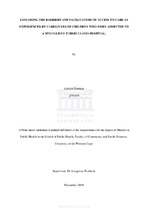| dc.description.abstract | Tuberculosis (TB) continues to be a major cause of ill health and the leading cause of death from a single infectious agent worldwide. Furthermore, young children, especially those under five years old and infants, are at risk of developing more severe forms of TB. TB cases continue to cluster among disadvantaged groups such as the poor whose lives are characterised by adverse living conditions. Defaulting from treatment poses a severe threat to children’s health because untreated TB or breaks in treatment could lead to a child developing more severe forms of TB, or worse, could result in mortality. Currently, long-term hospitalisation has the most successful TB treatment outcomes. Therefore, to ensure compliance, children are taken out of their social environment and admitted to hospital. However, being separated from one’s family, especially at a crucial stage of development, could have long-terms effects on the child’s development.
The study explored, factors influencing access to care that caregivers of children; who are five years and younger, who received prolonged treatment at a specialised TB hospital in the Western Cape, South Africa experienced. A qualitative approach allowed the researcher to use personal interactions as a focus for studies and was suitable when aiming to understand health behaviour in its everyday context as experienced by the participant.
The study results indicated the factors that enable caregiver visitation, is largely dependent on availability of finances. Furthermore, the hospital itself was identified as being accommodating with regards to visiting hours, telephonic calls and served as important mediator between health service provider, the children, their caregivers and the rest of the staff. Visitation depended on availability of finances, and this was the main barrier that was identified by caregivers. The challenges that hampered visitation were unemployment, lack of access to private and public transport and challenges related to farm-workers. A large number of caregivers work on farms in the Cape Winelands and many of them are dependent on seasonal work which results in inconsistent income. This limited availability of finances for visitation. Furthermore, the working conditions, long shifts and lack of employment benefits which were associated with farming, prevented caregivers from visiting.
This study revealed that there are a series of factors which influence access to care of caregivers; this is especially the case in children hospitalised for TB. These factors need to be considered by policy makers as well as the Specialised Tuberculosis facility when dealing with children under five as the best way to ensure that treatment is completed through hospitalisation. Therefore, the strategies to assist families of children with TB need to be explored to assist in the continuity of care as well as the child’s development. | en_US |

